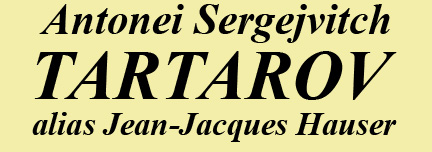The great concert
Translation of the page in Italian
The curriculum
The story of Tartarov the pianist gushed out from Hannes Keller's vivid fantasy (signed with the nickname "Arno Fischer"), and it could be compared to a beautiful fairy tale. Along with the performer's picture with an intense and dull expression, got to captivate the audience immediately, and was frequently requested by the press and television shows.
In 1942, after having departed from the west front, the german pianist Kaspar Rosen arrived to Ukraine and found hospitality in a jewish family. His attention was drawn right away toward a young man that would spend the whole day improvising on an old rusty piano. With astonishment he found out that Antonej had never taken any music lessons, and that, being mute and helpless, he expressed himself through the piano.
Rosen was delighted by the discovery of this exceptional character, this new way of communicating with the instrument, the sonic expression full of essential force of touching lyrical passages, alternating successfully with violent, almost suffering motifs… In summary, a blend of styles that could recall to Schumann, Skriabin, and Prokofiev, all in the power of an extremely strong and agile hand, that knew no technical problems, its extraordinary extension allowed the performance of any virtuosic passage.
Immediately, Rosen got the old instrument fixed, and developed with Tartarov a pragmatic study program. His progress was outstanding, Tartarov assimilated with extraordinary speed every lesson, and his enthusiasm for the new world he was discovering was unrestrainable.
In a brief time, Tartarov became an exceptional pianist, which drove Rosen to plan a great concert to present him to the music world. By chance, a russian musician after discovering Tartarov, wanted to introduce him to his wealthy and well-connected friends in Paris.
Currently, Tartarov lives in Paris, where his patrons are happy to offer him all the possibilities to master his art.
Lately, a fact of enormous importance was revealed, not only for Tartarov, but for the entire music world.
Tartarov's patrons have acquainted that a misanthropic, slavic, old baron lives in Paris, presumed to be the son of a Franz Liszt fan. From his mother, he inherited a chest which he kept jealously, containing precious relics, and musical manuscripts written by great composers. Despite the many exhortations from his close friends he never wanted to give them away.
But fortunately, the Tartarov's story touched him, and after many reticence, the baron allowed Tartarov to take a look to the manuscripts in his attic, requesting him to put them back in the chest after having read them.
So Tartarov, with huge anxiety, got to rummage through the chest. In fact, there were many manuscripts, most of them had no value at all, but suddenly Mozart's unmistakable hand writing revealed a rondò over a popular theme, and then Beethoven's showed a piano sonata sketch.
At last, a pianistic version of a Listz's piece for orchestra. Without doubt, three original pieces by great composers.For a few hours Tartarov was sunken in the study of this precious pieces, but then as promised, he played them for the baron before putting them back in the chest.
Tartarov dedicated the following days to rebuild the pieces, specially Beethoven's sonata that was left unfinished unfortunately.
At this point, Tartarov's patrons believed it was mandatory to share this discovery with the world by organizing a great concert.
The making of such concert was possible thanks to Hannes Keller who in several months managed to solve all the organization issues.
![[Trademark Tartarov]](../../images/mark.jpg)
